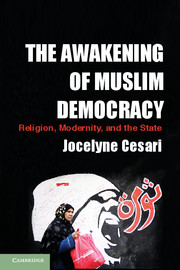Book contents
- Frontmatter
- Contents
- Acknowledgments
- Preface
- Part I THE MAKING OF ISLAM AS A MODERN RELIGION
- Part II ISLAMISM AS THE PREEMINENT POLITICAL FORCE PRE– AND POST–ARAB SPRING
- 7 Political Opposition through Islamic Institutions
- 8 Ideological Strength of Islamist Opposition
- 9 From Martyrs to Rulers
- Part III THE DISJUNCTION OF DEMOCRACY AND SECULARISM – LESSONS LEARNED FROM THE ARAB SPRING
- Appendix I Religious Violence Index
- Appendix II Egyptian Constitution, Ratified on December 26, 2012. Suspended on July 3, 2013
- Bibliography
- Index
- References
8 - Ideological Strength of Islamist Opposition
Published online by Cambridge University Press: 05 July 2014
- Frontmatter
- Contents
- Acknowledgments
- Preface
- Part I THE MAKING OF ISLAM AS A MODERN RELIGION
- Part II ISLAMISM AS THE PREEMINENT POLITICAL FORCE PRE– AND POST–ARAB SPRING
- 7 Political Opposition through Islamic Institutions
- 8 Ideological Strength of Islamist Opposition
- 9 From Martyrs to Rulers
- Part III THE DISJUNCTION OF DEMOCRACY AND SECULARISM – LESSONS LEARNED FROM THE ARAB SPRING
- Appendix I Religious Violence Index
- Appendix II Egyptian Constitution, Ratified on December 26, 2012. Suspended on July 3, 2013
- Bibliography
- Index
- References
Summary
Contemporary Islamist ideology is the offspring of the pan-Islamist and revivalist movements analyzed in Part I of this book. However, after several decades under authoritarian rule, the strategy and doctrine of Islamists have adjusted to the national framework, which has entailed compromising with the state and reorienting their political discourse toward social justice and the fight against corruption.
ISLAMISM AS A NATIONAL OR COUNTER-NATIONAL PROJECT
As shown in Part I, Islamism was, at the end of the Ottoman Empire, opposed to nationalism, perceived as a Western imported concept. However, after the decolonization process, the nation ceased to be a foreign and Western concept and became the framework in which politics took place. Thus, Islamist opposition movements gradually used Islam more as an alternative to the secular nationalism promoted by state elites and less as a way to promote a pan-Islamic caliphate. In this sense, they have increasingly operated within the context of the newly defined national political community. In this regard, the evolution of the Muslim Brotherhood from a transnational movement to diverse national ideologies is paradigmatic of this change.
In Egypt, the Muslim Brotherhood believed it held the key to true Islam, and therefore to rightful authority, whereas the state policies were impure. Hassan al-Banna argued that the purest period of Islam was during its golden age, when Muhammad and his successors, the Four Rightly-Guided Caliphs, ruled the umma. Thus, the Muslim Brotherhood’s ultimate political goal was to create an Islamic order or niȥām islāmī, which emphasized a foundation in shariʿa. While al-Banna advocated the implementation of shariʿa, the Brotherhood’s program also recognized the nonlegal aspects of its vision and worked to improve the social, economic, and political aspirations of the Egyptian people.
- Type
- Chapter
- Information
- The Awakening of Muslim DemocracyReligion, Modernity, and the State, pp. 167 - 210Publisher: Cambridge University PressPrint publication year: 2014



